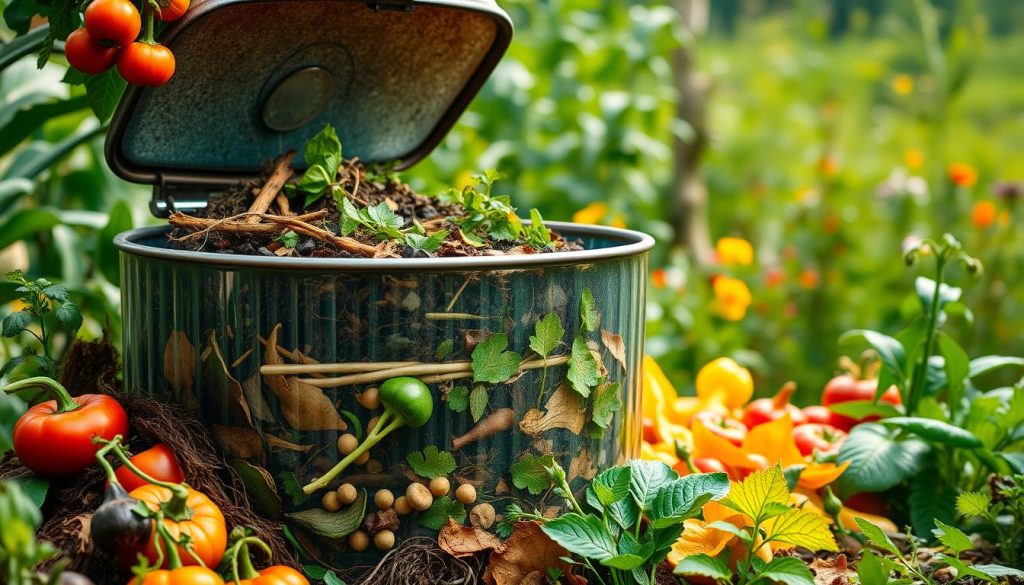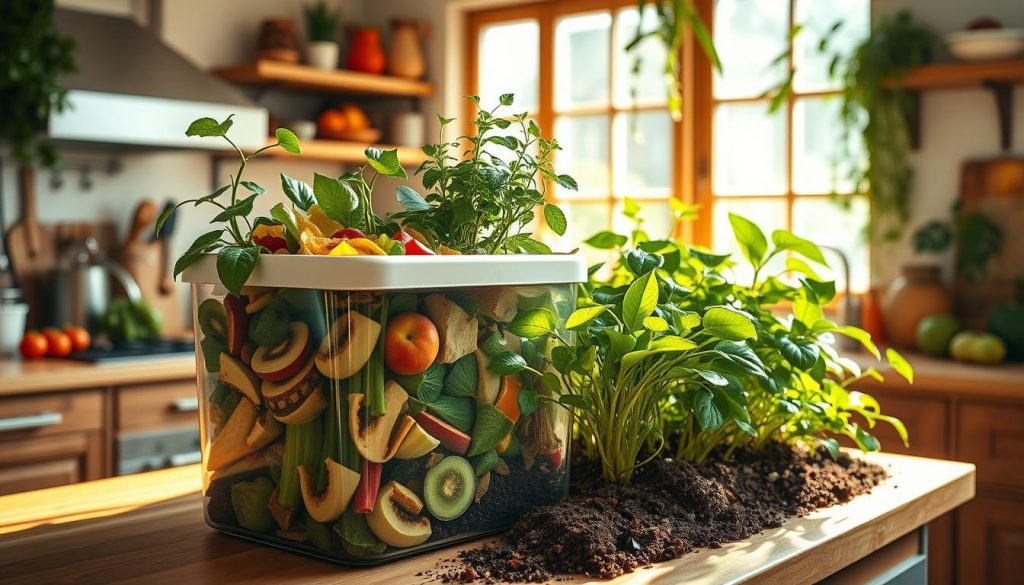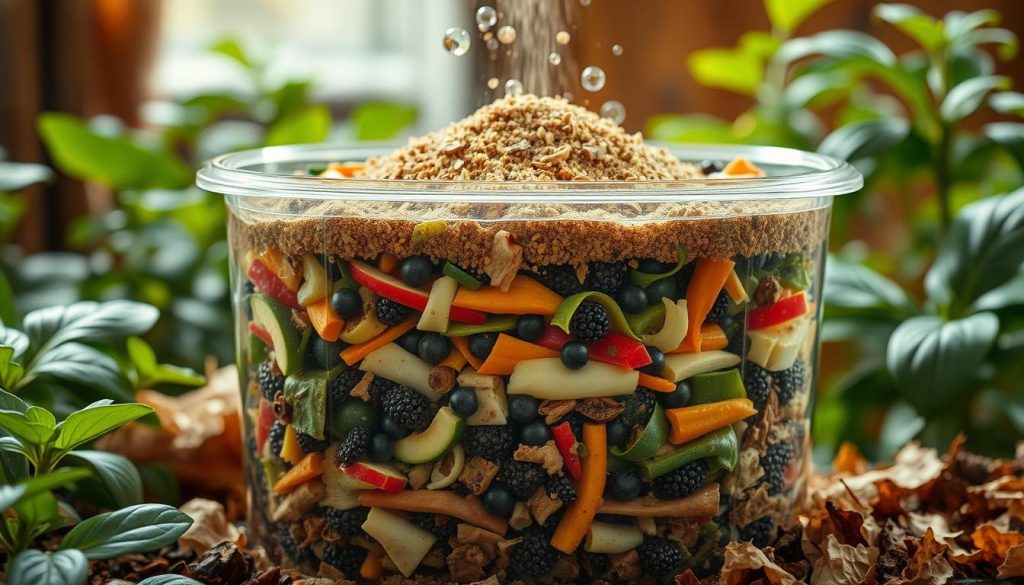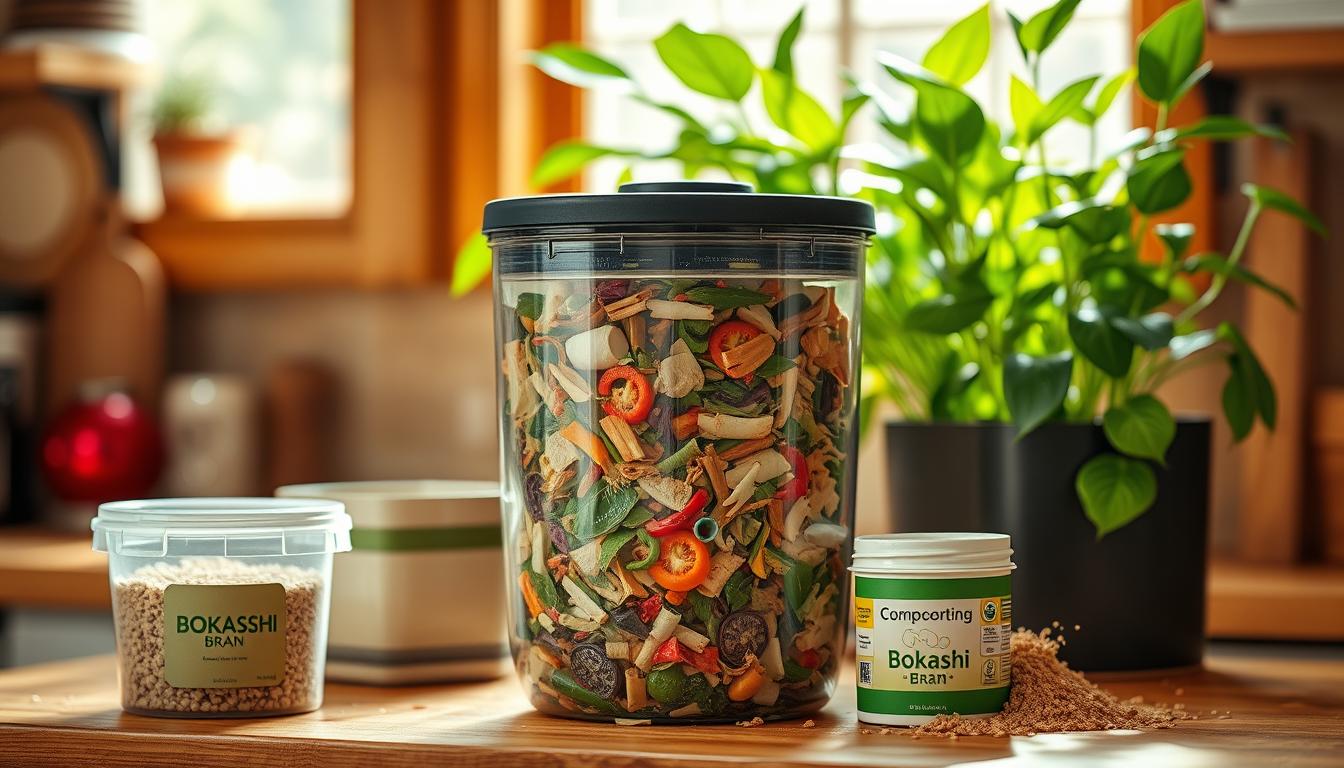I’m excited to share my experience with Bokashi compost systems. They’ve changed the game for me, helping me reduce waste and create nutrient-rich soil. By using Bokashi composting, I’ve cut down my household waste a lot. Plus, I now have a natural fertilizer for my garden.
Bokashi compost systems are all about fermentation composting. This method lets me recycle organic waste that would otherwise go to landfills. It’s not only good for the environment but also gives me a steady supply of compost for my garden.
My journey with Bokashi composting taught me a lot about fermentation composting. It’s key to making my Bokashi systems work well. By mastering these techniques, my garden stays healthy and thriving. I also support sustainable gardening and use less synthetic fertilizers, thanks to Bokashi compost systems and organic waste recycling.
What is Bokashi Composting and Why I Love It
I’ve recently discovered Bokashi composting, a method that mixes kitchen scraps with microbes to make rich soil. It’s not only cut down my waste but also made my garden healthier.
Bokashi composting adds microbes to kitchen scraps, which then ferment and break down. This method is great for city gardeners because it needs little space and care.
The Basics of Bokashi Composting
To start with Bokashi composting, I had to learn the basics. I learned about the microbes involved and how to create the right environment for fermentation. With a few simple steps, I set up my Bokashi system and began reducing my waste.
The Benefits of Bokashi for My Garden
Using Bokashi compost in my garden has brought many benefits. It has made my soil better and increased my crop yields. Bokashi is an eco-friendly way to garden, reducing my need for synthetic fertilizers.
Some key benefits of Bokashi composting are:
- Reduced waste: Bokashi composting turns kitchen scraps into valuable garden resources.
- Improved soil health: The microbes in Bokashi compost break down organic matter, making nutrient-rich soil.
- Increased crop yields: Using Bokashi compost has made my plants healthier and more productive.
How to Start My Bokashi Compost System

To start my Bokashi composting journey, I need to set up a good environment. I choose a composting bin that fits my indoor space and meets my waste management goals. A well-designed bin is key for effective composting, keeping the temperature and smell in check.
When picking a composting bin, I look at size, material, and ventilation. A bin with good airflow and a strong design is important for composting success. I also consider the waste I’ll compost and the space for the bin. The right bin makes waste management easy and sustainable.
Choosing the Right Composting Bin
- Consider the size of the bin and the amount of waste you generate
- Look for a bin with good ventilation and a sturdy design
- Think about the material of the bin and its durability
After choosing my composting bin, I focus on the Bokashi bran for waste breakdown. The right Bokashi bran is crucial for composting, adding microorganisms to decompose waste. With a good bin and the right Bokashi bran, I can create a thriving indoor composting system.
What Can I Compost with Bokashi?

Exploring Bokashi compost systems is exciting. It shows how to turn kitchen scraps into natural fertilizer. I can compost fruit and vegetable peels, tea bags, and coffee grounds with Bokashi.
Bokashi systems are perfect for kitchen composting. They handle many organic materials. This makes them great for creating nutrient-rich compost for my garden. Some top scraps to compost include:
- Fruit and vegetable peels
- Tea bags and coffee grounds
- Bread and grains
- Eggshells and dairy products
However, some items should not go into Bokashi bins. Avoid pet waste, meat and fish scraps, and oily foods. This keeps my compost healthy and free from harmful contaminants.
Bokashi composting is easy and effective. It helps reduce food waste and makes natural fertilizer for my garden. By following simple rules and avoiding certain items, I can make a compost that helps my plants grow well.
Troubleshooting Common Bokashi Issues

Using my Bokashi compost system, I’ve run into some common problems. Odor is a big one, showing an imbalance in the composting process. To fix this, I check that I’m using the right amount of Bokashi bran. This keeps the microorganisms in balance.
Another issue is slow decomposition. This can happen if there’s not enough oxygen or microorganisms. To solve this, I drain the liquid fertilizer often and add more Bokashi bran. This boosts the fermentation and speeds up decomposition. With these steps, my composting system stays healthy, making rich soil for my garden.
- Monitor the carbon-to-nitrogen ratio to ensure optimal microbial composting conditions
- Regularly drain the liquid fertilizer to prevent odor buildup and maintain a healthy balance of microorganisms
- Add more Bokashi bran to stimulate fermentation composting and speed up decomposition
By following these tips, you can solve common problems. This way, you’ll enjoy the benefits of eco-friendly composting with your Bokashi system.
Using Bokashi Compost in My Garden
I’m excited to share how bokashi composting has changed my garden. It’s all about reducing waste and making my garden better. My composting bin is key, turning food scraps into something valuable.
Using bokashi compost right is important. Here are some tips to make the most of it:
- Mix bokashi compost into your soil before planting to create a nutrient-rich foundation for your plants
- Use bokashi compost as a natural fertilizer to promote healthy plant growth and development
- Combine bokashi compost with other organic matter, such as leaf mold or worm castings, to create a diverse and thriving soil ecosystem
Adding bokashi compost to my garden has made it more sustainable. It’s good for my plants and the planet. If you’re new to composting or experienced, try bokashi compost. It can make a big difference.
The Environmental Impact of My Bokashi Journey
Looking back, I see how Bokashi composting has changed my home. It has cut down food waste and made gardening greener. This is thanks to organic waste recycling with Bokashi.
The Bokashi method turns kitchen scraps into a natural fertilizer. This reduces landfill waste and enriches the soil. It’s a win for our planet and our gardens.
I’m proud of my Bokashi journey. It shows how we can live more sustainably. By composting this way, we help our ecosystem thrive for generations to come.

